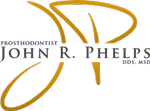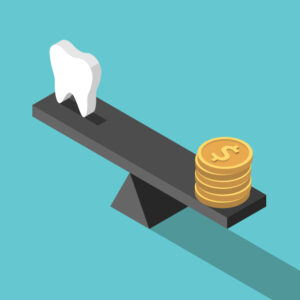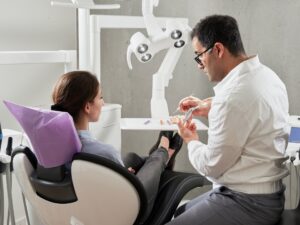There are myriad options for replacing missing teeth with dentures, dental bridges, and dental implants comprising the three most popular. Each of these options has its advantages and disadvantages, but which is right for you?
In his more than 25 years of experience, board-certified prosthodontist Dr. John R. Phelps has helped restore the smiles of thousands of patients. In this blog, he breaks down how dental implants with crowns can permanently restore your smile.
Dental Implants Replace the Tooth and the Root
When a dental implant is inserted into the jaw, it undergoes a process called osseointegration as it fuses into your jawbone. Dental implants are made of biocompatible materials and come fabricated with microscopic holes dotting their surface. During the process of osseointegration, connective tissue inserts into these holes, securing the implant in place. Once secure, the implant will not come loose or fall out so long as you maintain your oral health.
Osseointegration is critical because tooth loss also means losing the tooth root. Roots are vital to the health and strength of your jawbone. Without them, your jawbone may weaken and decay. Dental implants replace your roots, thereby keeping your jaw strong and healthy. A crown will be placed over the implant that’s customized to match your surrounding teeth.
How Durable Are Dental Crowns?
Dental implants are typically made of titanium, a hard but easily forged metal that is commonly used in bicycles, golf clubs, and crutches. As strong as steel, there is no risk of damaging a titanium implant under even extreme circumstances.
Dental crowns are typically milled from porcelain, zirconia, or ceramic. While durable, resilient, and natural-looking, these materials are not impervious to damage. It is likely that, over time, you will need to have your crowns replaced.
Luckily, Dr. Phelps offers CEREC dental crowns. This technology allows you to come in for restoration replacement and leave with a perfected smile over the course of just one office visit. Same-day dental crowns can also be used to restore teeth damaged through infection and decay.
Dental crowns are not permanent, but they can last for 10 or more years with proper care. Crowns are sculpted, shaded, and sized to fit perfectly into your smile. This enables aesthetic restoration in addition to functional and helps make crowns the best option for most dental implant patients.
Benefits of Dental Implants with Crowns
Although crowns may need to be replaced, the advantages offered by combining them with dental implants are clear:
- Restored bite tension
- Improved aesthetics
- Reduced risks of adjacent tooth slippage
- No damage to surrounding tooth structure
And, thanks to osseointegration, the chances of jaw shrinkage and collapse — frequent after tooth loss — are eliminated, enabling your crown to produce pleasing results up to the point it needs to be replaced. Your prosthodontists will be able to help you determine at what point that may become a necessity.
Bite restoration is easiest to maintain with one-day dental crowns. CEREC technology allows Dr. Phelps to replace damaged crowns immediately. This helps reduce the risk of additional damage being caused by broken or otherwise-compromised dental crowns.
Implant-Supported Dentures
Dental implants are most commonly restored with crowns, but it is possible to use them to secure dentures or dental bridges as well. Implant-supported dentures, such as All-on-Four®, are more reliable than those secured with adhesives. The same is true of the implant-supported dental bridge, an option that preserves adjacent teeth while offering a more long-lasting and dependable anchor.
These options may be better for people who are missing more than one tooth, with implant-supported dentures working best for replacing entire arches.
No matter if you choose dental implants, dentures, or a dental bridge, you must replace your missing teeth as soon as possible. Once a tooth is gone, the body begins to redistribute the minerals supporting the bone around it. This can result in jaw collapse, adjacent tooth slippage, bite irregularities, and additional tooth loss.
Contact Our Indianapolis Prosthodontist Today
As a board-certified prosthodontist, Dr. Phelps has years of additional training and education in the art and science of smile restoration. During your initial consultation with Dr. Phelps, he will determine the best solution for your smile.
Dr. Phelps serves Carmel, Noblesville, and nearby areas of Indianapolis. Call 317-548-6217 today to schedule a consultation.





